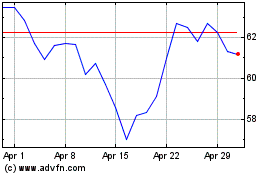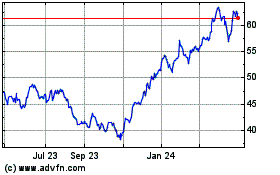Citigroup More Than Triples Its Dividend After Stress Test -- 2nd Update
June 29 2016 - 6:13PM
Dow Jones News
By Christina Rexrode
Citigroup Inc. got a green light on the Federal Reserve's stress
test for the second year in a row, and the bank announced it would
triple its shareholder dividend.
The Fed on Wednesday approved the New York bank's capital plan
after determining that Citigroup could keep lending in a severe
economic downturn. The bank said it would increase its quarterly
dividend to 16 cents, from 5 cents. It also received permission to
buy back up to $8.6 billion of its own shares in the coming year,
up from last year.
The Fed's approval gives breathing room to Citigroup CEO Michael
Corbat. The bank had failed the test twice, including one time
during his tenure as chief executive. One of Mr. Corbat's mandates
when he was installed in the job was to improve the bank's
relationship with regulators.
The Fed's approval is also particularly important to the bank
because many investors have been disappointed by its relatively low
dividends and share price. This marks just the second time since
the financial crisis that the bank has increased its dividend.
Citigroup shares rose 2.6% after-hours, the sharpest move of the
big six U.S. banks reviewed by the Fed.
Analysts had predicted that the bank would increase its dividend
to somewhere between 10 cents and 20 cents. Mr. Corbat said in a
statement that the bank remained "intently focused on strengthening
and improving Citi's capital planning process while delivering the
returns that our shareholders expect and deserve."
The bank might have also been helped because it took a more
conservative tack on its submission. Generally, the banks are more
optimistic than the Fed is about how they would fare in a severe
recession. But last week, on the first round of stress-test
results, Citigroup estimated that a key capital ratio would fall
lower than the Fed did.
Citigroup had another regulatory victory in April, when it was
the only bank to get approval for its "living will," which details
how it would navigate a potential bankruptcy, from both the Fed and
the Federal Deposit Insurance Corp.
The latest stress-test result assesses how the banks would fare
in a severe recession that included a 10% U.S. unemployment rate,
significant losses in corporate and commercial real estate lending
portfolios, and negative rates on short-term U.S. Treasury
securities.
The Fed calculated that at the low point of a hypothetical
recession, Citigroup's common equity Tier 1 ratio -- which measures
high-quality capital as a share of risk-weighted assets -- would be
7.7%, above the 4.5% level the Fed views as a minimum. The new
ratio, unlike the one reported last week by the Fed in the first
round of the test, takes into account the bank's proposed capital
plan.
The bank's Tier 1 leverage ratio, which measures high-quality
capital as a share of all assets, would be 6.1% in a hypothetical
recession under the Fed's estimates, above the 4% minimum.
Write to Christina Rexrode at christina.rexrode@wsj.com
(END) Dow Jones Newswires
June 29, 2016 17:58 ET (21:58 GMT)
Copyright (c) 2016 Dow Jones & Company, Inc.
Citigroup (NYSE:C)
Historical Stock Chart
From Mar 2024 to Apr 2024

Citigroup (NYSE:C)
Historical Stock Chart
From Apr 2023 to Apr 2024
